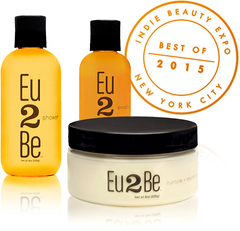
What magic there is in bare skin adoring the sun’s warmth!
And as spring glimmers on the horizon with promises of abundant green days, can we feel anything but joy in anticipation of stripping away winter’s layers?
It is in this moment we find good reason again 2Be Grateful for the sensory gift of our skin — and 2Be Fierce Guardians of our body's largest organ.
What better time to think of ourselves as discriminating skin care consumers?
If we are to nourish our skin, we must be faithful, informed readers of the labels on the products we choose.
But here’s what troubles me: Not all skin care labels are created equal.
>> Follow 'You to Be': Instagram | Twitter | Facebook | Pinterest
Granted, a label’s job is to sell the goop inside, and the best labels, like healthy skin, let all the goodness of a product shine through.
But so many labels today are layered with marketing speak and stories about magic ingredients it’s hard to know what’s really inside.
Like skin that has been plastered with foundation and color, we can’t help but wonder whether labels are laying it on thick to minimize a product’s flaws, or are unnecessarily working overtime to embellish its simplicity.
At Eu2Be, we live by the simple beauty of our culturally prized skin-conditioning oils — and that’s why our labels aren’t slathered in inflated marketing claims or sly language.
When it comes to labeling, the power of “the story” often dominates. But there are rules. Lots of them. The Food & Drug Administration is quite specific about what you can and cannot say about your ingredients and how to list them on your label.
These rules don’t prohibit marketing claims though, which means brands have a great deal of latitude in their label stories as long as they don’t infringe the rules.
So it’s up to us to ask the tough questions about skin care ingredient labels:
- When a label says “90% of users said they saw results,” how many users were asked? Ten users? 100? 1,000? There’s a big difference.
- When a label says “dermatologist approved” does it mean by one dermatologist — and if so, who?
- When you see aloe on a label, did you know a vast majority of these products use an aloe concentrate that is reconstituted (and greatly diluted) in water?
So here’s the truth about ingredients like aloe and essential oils: Pure ingredients are incredibly expensive and hard to find on the shelf — but most consumers can’t know that by reading the label alone.
We all love a good story—especially those with leading characters that reinforce our ideals. But the best stories teach us to discern the line between truth and fiction.
So as winter loosens its reach into spring, be discerning about the products you choose to nourish your skin and take the extra time to think about the fact and fiction behind product labels.
See our natural skincare reviews and customer testimonials.
Or shop now for Eu2Be's natural skincare products.



Reader Comments ( 0 )